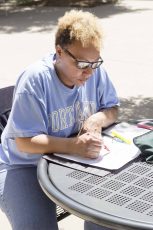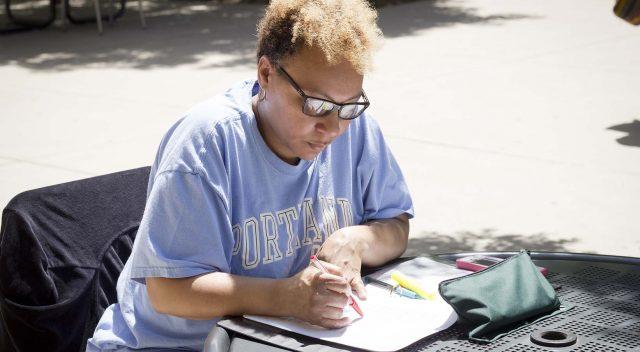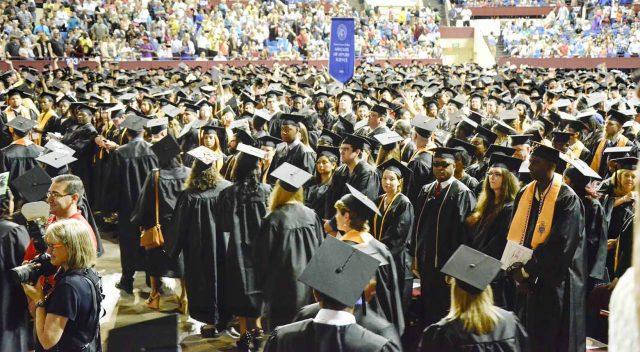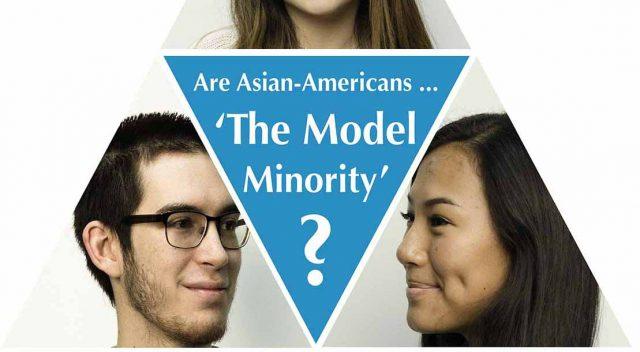By Jeremy Moore/ se news editor

Bogdan Sierra Miranda/The Collegian
Research has shown that African-American representation is low in some majors that lead to higher-paying jobs.
None of the top 10 majors with the highest median earnings are in the 10 most frequent majors chosen by African-Americans, according to Georgetown University.
The research found that African-Americans represent only 5 percent of computer science majors, 8 percent of engineering and 7 percent of mathematics.
Social work, early childhood education, human services and community organization are a few majors among the 10 lowest median earnings. Social work is third in the 10 most frequent majors chosen by African-Americans.
SE student Cameron Rowe chose to major in computer science as a freshman. Eventually, he decided to switch to photography.
“Initially, I chose computer science because I knew it paid a lot of money, and I was really good at it. But it just wasn’t something I was passionate about,” he said. “I’m more passionate about photography, and I’d rather enjoy what I do than do something just to make money off of it.”
According to the research, African-Americans have a high representation in majors that deal with community service. NE special projects coordinator Raytosha Jones falls into this category.
“I enjoyed my college experience so much that I wanted to work in higher education,” she said. “I was a first-generation college student, and I went to the University of Minnesota. Now I just want to do my part to help students enjoy their college years as well.”
When SE student Alia Feagins decided to be a history major, money did not factor into her decision.
“I chose history because it’s something I’ve been interested in since … forever,” she said.
Like Feagins, SE student Dominique Moreland chose his major in kinesiology because of his passion for the field and not potential earnings.
“It’s not about the money. It’s just about what you enjoy doing the most,” he said. “You want to pursue a career that you want to do the most.”
Child care may not be considered among most as a high-paying career, but this does not worry NE child center teacher Yolanda Jones. She trusts in her faith as her ultimate source of income.
“Is it about money or making a difference?” she said. “I’m successful because I’m able to get up every day and love what I do.”
The research found that sociology is another popular major among African-Americans, but it is not a major in the 10 highest median earnings. NE sociology professor Murray Fortner likes to point out that Martin Luther King Jr. was a sociology major.
“In sociology, we call it horizontal versus vertical mobility,” he said. “We have to advance our degrees and make them pay off.”
STEM majors are known to lead to higher-paying careers, but Fortner believes that African-Americans are not pushed to be interested in these majors early on. Any degree can lead to a high-paying career, depending on how far students decide to take their degrees, he said.
SE student Khalid Adams is a mechanical engineering major, and he never let any statistics discourage him when he chose his major.
“I’ve just always wanted to become an engineer,” he said. “I always wanted to be a civil engineer, but after talking with one of my friends who’s an African-American mechanical engineering major, I decided to switch to that.”
He believes the amount of time it may take to receive some STEM degrees is a factor in why some students choose other majors.
“For the higher-paying jobs, you have to go through a lot of years in school,” he said. “That’s why a lot of people don’t shoot to get those high-paying jobs. When they look into careers like medical ones and see it’ll take eight or nine years of school, they just look away from it.”
Fortner is a sociopsychologist with a doctorate in media studies and communication science. In high school, he graduated second in his class and felt he could have pursued any degree, but he chose to follow his passion. He feels African-American students today are doing this as well.
“African-Americans aren’t choosing low-paying careers. They’re choosing likes over dislikes,” he said. “Whatever your talent or passion is, take it as high as you can.”




























